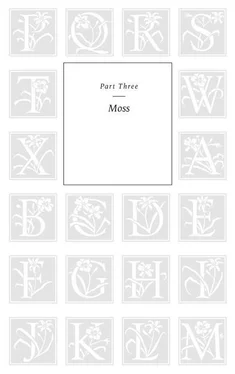Vanessa Diffenbaugh - The Language of Flowers
Здесь есть возможность читать онлайн «Vanessa Diffenbaugh - The Language of Flowers» весь текст электронной книги совершенно бесплатно (целиком полную версию без сокращений). В некоторых случаях можно слушать аудио, скачать через торрент в формате fb2 и присутствует краткое содержание. Жанр: Старинная литература, на английском языке. Описание произведения, (предисловие) а так же отзывы посетителей доступны на портале библиотеки ЛибКат.
- Название:The Language of Flowers
- Автор:
- Жанр:
- Год:неизвестен
- ISBN:нет данных
- Рейтинг книги:4 / 5. Голосов: 1
-
Избранное:Добавить в избранное
- Отзывы:
-
Ваша оценка:
- 80
- 1
- 2
- 3
- 4
- 5
The Language of Flowers: краткое содержание, описание и аннотация
Предлагаем к чтению аннотацию, описание, краткое содержание или предисловие (зависит от того, что написал сам автор книги «The Language of Flowers»). Если вы не нашли необходимую информацию о книге — напишите в комментариях, мы постараемся отыскать её.
The Language of Flowers — читать онлайн бесплатно полную книгу (весь текст) целиком
Ниже представлен текст книги, разбитый по страницам. Система сохранения места последней прочитанной страницы, позволяет с удобством читать онлайн бесплатно книгу «The Language of Flowers», без необходимости каждый раз заново искать на чём Вы остановились. Поставьте закладку, и сможете в любой момент перейти на страницу, на которой закончили чтение.
Интервал:
Закладка:
Grant was still in the parking lot, unloading his truck. I waited for him to hand me buckets and then carried them inside. There was only one stool in his booth; I sat down on it, and Grant leaned against the plywood wall.
“You’re early,” he said.
I looked at my watch. It was just past three in the morning. “You, too.”
“I couldn’t sleep,” he said. I couldn’t, either, but I didn’t say anything.
“I met this woman,” I said. I turned my stool away from Grant as if I would help a customer through the window, but the market was nearly empty.
“Yeah?” he said. “Who?”
“Just some woman,” I said. “She came into Bloom yesterday. I helped her sister last weekend. She says her husband doesn’t want her anymore. You know, in a—” I stopped, unable to finish.
“Hmm,” Grant said. I felt his eyes all over my back, but I didn’t turn to face him. “That’s tough. It was the Victorian era, you know? Not a lot of talk about sex.”
I hadn’t thought of that. We watched the market begin to fill in silence. Renata would come through the door any minute, and I would think of nothing but someone else’s wedding flowers for hours.
“Desire,” Grant said finally. “I would go with desire . I think that’s as close as you’ll get.”
I didn’t know desire. “How?”
“Jonquil,” Grant said. “It’s a form of narcissus. They grow wild in the southern states. I have some, but the bulbs won’t bloom till spring.”
Spring wasn’t for months. Annemarie didn’t appear as though she could wait that long. “There’s no other way?”
“We could force the bulbs in my greenhouse. I don’t, usually; the flowers are so associated with spring, there isn’t much of a market for them until late February. But we can try, if you want.”
“How long will it take?”
“Not long,” he said. “I bet you could see flowers by mid-January.”
“I’ll ask her,” I said. “Thanks.” I started to walk away, but Grant stopped me with his hand on my shoulder. I turned around.
“This afternoon?” he asked.
I thought about the flowers, his camera, and my dictionary. “I should be done by two,” I said.
“I’ll pick you up.”
“I’ll be hungry,” I said as I walked away.
Grant laughed. “I know.”
Annemarie looked more relieved than disappointed when I told her the news. January would be fine, she said, better than fine. The holidays were busy; the month would be a blur. She wrote down her phone number, wrapped her body tightly with the red belt of her coat, and walked out the door after Bethany, who was already halfway up the block. I had given her ranunculus: You are radiant with charms .
Grant was early, as he had been the week before. Renata invited him in. He sat at the table, watching us work and eating chicken curry out of a steaming foam container. A second container, unopened, sat beside him. When I finished the table arrangements, Renata said I could go.
“The boutonnieres?” I asked, looking into the box where she was lining up the bridesmaids’ bouquets.
“I can finish them,” she said. “I have plenty of time. You just go on.” She waved me out the door.
“You want to eat here?” Grant asked, handing me a plastic fork and a napkin.
“In the car. I don’t want to waste light.” Renata looked at us with curiosity but didn’t ask. She was the least meddlesome person I had ever met, and I felt a twinge of affection for her as I followed Grant out the door.
The curry and our breath fogged the windows on the long drive to Grant’s house. We drove in silence, the only noise the constant hum of the defroster. It was wet out, but the afternoon was clearing. By the time Grant opened the gate and drove past the house, the sky was blue. He went inside for the camera, and I was surprised to see him enter the square three-story building and not the house.
“What’s that?” I asked when he returned, gesturing to the building from which he had just come.
“The water tower,” he said. “I converted it into an apartment. You want to see inside?”
“Light,” I said, looking to where the sun was already starting to descend.
“Right.”
“Maybe after.”
“Okay. You want another lesson?” Grant asked. He stepped toward me and dropped the camera strap around my head. His hands brushed against the back of my neck.
I shook my head no. “Shutter speed, aperture, focus,” I said, turning dials and repeating the vocabulary he had thrown at me the week before. “I’ll teach myself.”
“Okay,” he said. “I’ll be inside.” He turned and walked back into the water tower. I waited until I saw a light flip on in the third-story window before I turned toward the rose garden.
I would start with the white rose; it felt like a good place to begin. Sitting in front of a flowering bush, I dug a blank notebook out of my backpack. I would teach myself photography by documenting my successes and my failures. If, next week, I developed the film and saw that only one photo was clear, I needed to know exactly what I had done to produce the image. I numbered a sheet of paper from one to thirty-six.
In the waning light I photographed the same half-opened white rosebud, writing down in descriptive, nontechnical terms the reading of the light meter and the exact positions of the various dials and knobs. I recorded the focus, the position of the sun, and the angles of the shadows. I measured the distance of the camera to the rose in multiples of the length of my palm. When I ran out of light and film, I stopped.
Grant was sitting at his kitchen table when I returned. The door was open, and inside was as cold as outside. The sun had disappeared, and with it all warmth. I rubbed my hands together.
“Tea?” he asked, holding out a steaming mug.
I stepped in and closed the door behind me. “Please.”
We sat across from each other at a weathered wood picnic table identical to the one outside. It was pushed up against a small window that framed a view of the property: sloping rows of flowers, the sheds and greenhouses, and the abandoned house. Grant stood up to adjust the lid on a rice cooker that was spewing liquid out of a small hole. He opened a cupboard and retrieved a bottle of soy sauce, which he set on the uneven table.
“Dinner’s almost ready,” he said. I looked at the stove. Nothing was cooking except the rice. “You want a tour?”
I shrugged but stood up.
“This is the kitchen.” The cupboards were painted a pale green, the countertops gray Formica with silver trim. He didn’t appear to own a cutting board, and the counters were dented and scraped from slicing. There was an antique white-and-chrome gas stove with a folding shelf, and on the shelf sat a row of empty green glass vases and a single wooden spoon. The spoon had a white sticker with a faded price on its tip, leading me to think it had either never been used or never been washed. Either way, I was not particularly anxious to sample his cooking.
In the corner of the room was a black metal staircase, spiraling through a small square hole. Grant began to climb, and I followed him up. The second floor contained a living room big enough for only an orange velour love seat and a floor-to-ceiling bookshelf. An open door led to a white tile bathroom with a claw-foot tub. There was no television and no stereo. I didn’t even see a telephone.
Grant stepped back onto the staircase and led me to the third floor, which was covered wall to wall with a thick foam mattress. Crumbling foam was visible where the sheets had peeled away from the edges. Clothes sat in piles in two corners, one folded, the other not. Where there should have been pillows, there were stacks of books.
Читать дальшеИнтервал:
Закладка:
Похожие книги на «The Language of Flowers»
Представляем Вашему вниманию похожие книги на «The Language of Flowers» списком для выбора. Мы отобрали схожую по названию и смыслу литературу в надежде предоставить читателям больше вариантов отыскать новые, интересные, ещё непрочитанные произведения.
Обсуждение, отзывы о книге «The Language of Flowers» и просто собственные мнения читателей. Оставьте ваши комментарии, напишите, что Вы думаете о произведении, его смысле или главных героях. Укажите что конкретно понравилось, а что нет, и почему Вы так считаете.












